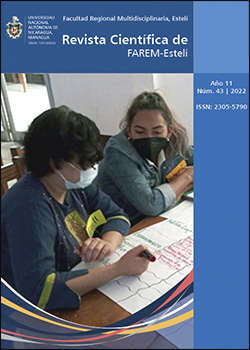Previous English Linguistic competences in first-year student, FAREM-Matagalpa, UNAN-Managua. Nicaragua: Case study
DOI:
https://doi.org/10.5377/farem.v11i43.15139Keywords:
Competencies, prior knowledge, diagnosis, descriptors, skillsAbstract
This article deals with the preliminary advances of a doctoral study, whose first objective was to identify the previous linguistic competences of English that the students bring with them upon entering their teacher training program in this language, in order to propose didactic actions that mitigate the difficulties that may be found. This study uses a mixed method approach, where qualitative and quantitative are combined. For data collection purposes, an English diagnostic test was administered to 42 students, considered a unit of analysis within the case study strategy. The test evaluated the four macro skills of the English language and the micro skill of grammar. For the descriptive statistical analysis, the SPSS software and the Excel program were used. Likewise, the analysis of the results obtained in the diagnostic test used as a reference the CEFR descriptors (2002) at levels A1, A2, B1. According to the results, it can be determined that first-year students reached a basic user level A1 according to the scale of descriptors, which indicates that they have basic sufficient skills to interact in very simple and daily conversations. The skills in which the participants showed greater difficulty were: listening comprehension, oral and written expression.
Downloads
References
Ausubel. (1980). Psicología Educativa. Un punto de vista cognoscitivo. México: 4a. Ed. Trillas/ disponible en: http://www.educainformatica.com.ar/docentes/tuarticulo/educacion/
Bachman, L. (1995). Habilidad lingüística comunicativa. Madrid: Edelsa.
Baro, A. (2011). Metodologías activas y aprendizaje por descubrimiento. Revista Digital Innovación y Experiencias Educativas, 40, 1-11.
Barón, J. & Bonilla, L. (2011). La calidad de los maestros en Colombia: Desempeño en el examen de Estado del ICFES y la probabilidad de graduarse en el área de educación.
Barría, V., Cifuentes, E., Saavedra, V., & Vargas, P. (2019). Conocimiento previo y creación de contexto: una investigación semiótica entre aprendientes de inglés. Documentos Lingüísticos y Literarios/ Universidad de Chile, 38: 10-18, 2019 .
Berenguer, I., & Roca-Villa, M. (2016). La competencia comunicativa en la enseñanza de idiomas. Dominio de las Ciencias/ Revista Científica, Vol. 2, núm 2, pp. 25-31.
British Council. (mayo de 2015d). English in Colombia: An examination of policy, perceptions and influencing factors. Recuperado de https://ei.britishcouncil.org/sites/
default/files/latin-america-research/English%20in%20Colombia.pdf
Coll, C. (1983). La construcción de esquemas de conocimientos en el proceso de enseñanza/aprendizaje. En C. Coll, Psicología genética y aprendizajes escolares. Madrid: Siglo XXI.
Cronquist, K. & Fiszbein, A. (2017). El aprendizaje del inglés en América Latina. Informe.
Farrell, T.S., & Richards, J. (2007). Teachers’ language proficiency. In T.S.
Hernández, R., Fernández, C., & Baptista, P. (2014). Metodología de la Investigación. México, DF: McGraw-Hill.
Hymes, D. (1972). On Communicative Competence. En J. P. Hymes, Sociolinguistics. Harmondsworth: Penguin Books Ltd.
MCER. (2002). Marco Común Europeo de Referencias para las Lenguas: Aprendizaje, enseñanza, evaluación. Madrid, España: Instituto Cervantes para la traducción en español.
Mexicanos Primero (2015). Sorry. Learning English in Mexico. México, DF: Mexicanos Primero, Visión 2030 A.C. Disponible en http://www.mexicanosprimero.org/
index.php/educacion-en-mexico/como-esta-la-educacion/estado-de-la-educacion-en-mexico/sorry-2015/sorry-english
MINED. (2011). Programa de Estudio Educación Secundaria. Lengua Extranjera. Managua: Ministerio de Educación de Nicaragua.
Núñez, J. (2018). Los métodos mixtos en la investigación en educación: hacia un uso reflexivo. Cuadernos de pesquisa, 47(164), p. 632-649.
Pérez, C. (2009). Modelo para perfeccionar la competencia pedagógica de los estudiantes de Licenciatura en Lenguas Modernas de la Universidad de Puebla. Puebla, México: Tersis doctoral Universidad de Camagüey.
Pilleux, M. (2006). Competencia comunicativa y análisis del discurso. Estudios filológicos, 143-152.
Prichard, Caleb. Reading Strategy Use of Lowand High-Proficiency Learners and the
Effect of Reading Instruction. 2014: pp.115–122.
Sadighi, F., & Zare, S. (2006). Is listening comprehension influenced by
background knowledge of the learners: A case study of Iranian EFL learners‟. The Linguistics Journal, 1(3) Shiraz University of Iran.
Sánchez-Jabba, A. (2013). Bilingüismo en Colombia. Bogotá, Colombia: Documentos de Trabajo sobre economía regional y urbana/ Canco de la República-Economía Regional DOI: 10.32468/dtseru.191.
Stake, R. (2005). Investigación con estudio de casos. Madrid: Ediciones Morata.
UNAN. (2021). Diseño curricular para el desarrollo de competencias en la UNAN. Managua: UNAN.
UNAN-Managua (2011). Modelo Educativo, Normativa y Metodología para la Planificación Curricular 2011.
Yin, R. (1994). Case Study Reseach: Design and Methods. London: Sage publication, Thousand Oaks, CA.
Yuyun, I. “A Study of Reading Skills in an English Proficiency Test.” Ninth Conference on English Studies (CONEST 9). Ed. Yanti. Jakarta: Center for Studies on Language and Culture – Atma Jaya Catholic University of Indonesia, 2012. pp.33–25. Print.
Published
Issue
Section
License
Copyright (c) 2022 Revista Científica de FAREM-Esteli

This work is licensed under a Creative Commons Attribution-NonCommercial-ShareAlike 4.0 International License.



